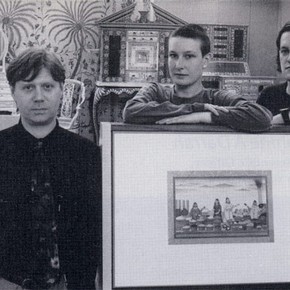Conservation Journal
July 1992 Issue 04
Editorial
This is the fourth issue of the V&A Conservation Journal within a year, which means the brave assertion that we could produce a quarterly publication has yet to be disproved. The editorial board intends to review the first year's production to see whether the quality and variety of contributions fulfil the demanding and wide-ranging brief that was set. Even if we find we have fallen short of our ideals, it will be heartening to remember that we have received a stream of complimentary letters and phone calls from around the world since our first edition.

Alan Cummings with graduating students Dianna Drummond and Stephen Newman in the Nehru Gallery (click image for larger version)
There is an obvious theme to this issue, which is 'timber.' There are articles about timber identification, about the interaction of timber and metals and about the conservation of painted wooden furniture. Yet there is a more timely issue, forming an underlying theme, which is that of training. It is internationally timely because the ICOM Conservation Committee Training Group met recently in London, and nationally so because the Museums Training Institute (MTI) is moving inexorably towards establishing standards of competence for conservation. More locally it is very timely because, as we go to press, the first students admitted to the RCA/V&A Joint Course will be graduating at the end of their third year.
Future editions of this journal will contain news not only of student departures but of the retirements of a number of long-serving senior members of staff. How difficult it is to replace them will depend on the quality of staff who give conservation training and the potential of those selected to receive it. One measure of this can be found in the three articles on timber. One was written by the person who organised the Diploma Course that preceded the MA Course, one was written by a past Diploma student who lectures on the present course and the third by a current MA student.
In April, a three day meeting of the ICOM Conservation Training Group took place at the Museum of Mankind. Three days is a long time if a group of trainers can find nothing new to say about training. It can be made to seem even longer if the majority of trainers are such appalling communicators that they offend every one of the few simple rules of effective presentation. By comparison it was a positive relief a month later to sit through three afternoons of short talks by the fourteen students on the Joint Course. The students all made good eye-contact with the audience, didn't read from a script, used
bright slides and simple overheads and never stood between the projector and the screen. It's actually not true that there was nothing new at the ICOM Training Conference because there were two talks about dealing with National Vocational Qualifications (NVQs), one of which was quite convincing.
The organisation responsible for developing NVQs within the conservation profession is the MTI. It is about time that something encouraging was written about the MTI but really it is very difficult to do. I have not been able to understand much of their attempts to communicate with me, and my efforts to become involved with them have been met with confusion and cancellation. At the only discussion I have succeeded in attending, the consultant was trying to devise succinct statements about the ethics of conservation. She was impressed with my pithy summations of complex situations even when I explained they were quotations from the URIC Guidance for Conservation Practice. She seemed unworried that even though she was involved in the final drafting of conservation standards, she had not heard of, let alone read, this seminal document about the profession.
When NVQs and the MTI were introduced as novel sets of initials a couple of years back we were told it was all necessary so that there could be complete comparability of qualifications across Europe by 1993. The MTI workshop and the ICOM conference left the feeling that it could take a little longer.
July 1992 Issue 04
- Editorial
- Furniture timbers
- Data from the ether
- A question of research
- The technical examination & conservation of painted furniture
- Interim meeting of the ICOM 'Graphic Documents' working group held at the V&A
- A review of the Institute of Paper Conservation Conference, Manchester, April 1st - 4th 1992
- A review of 'The Imperfect Image'
- Disaster reaction planning progress
- Corrosion of metals associated with wood